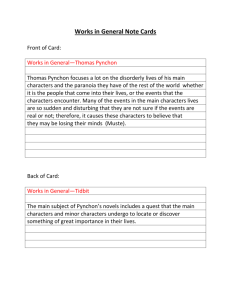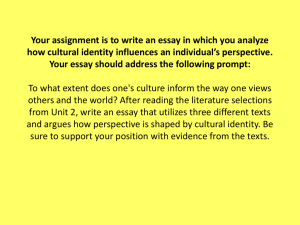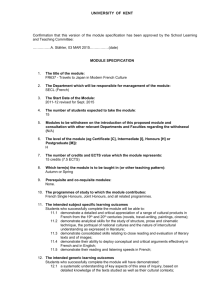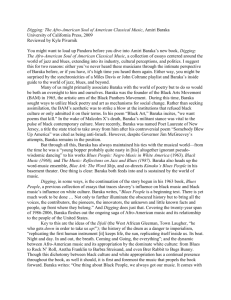Prof - UNC Greensboro
advertisement
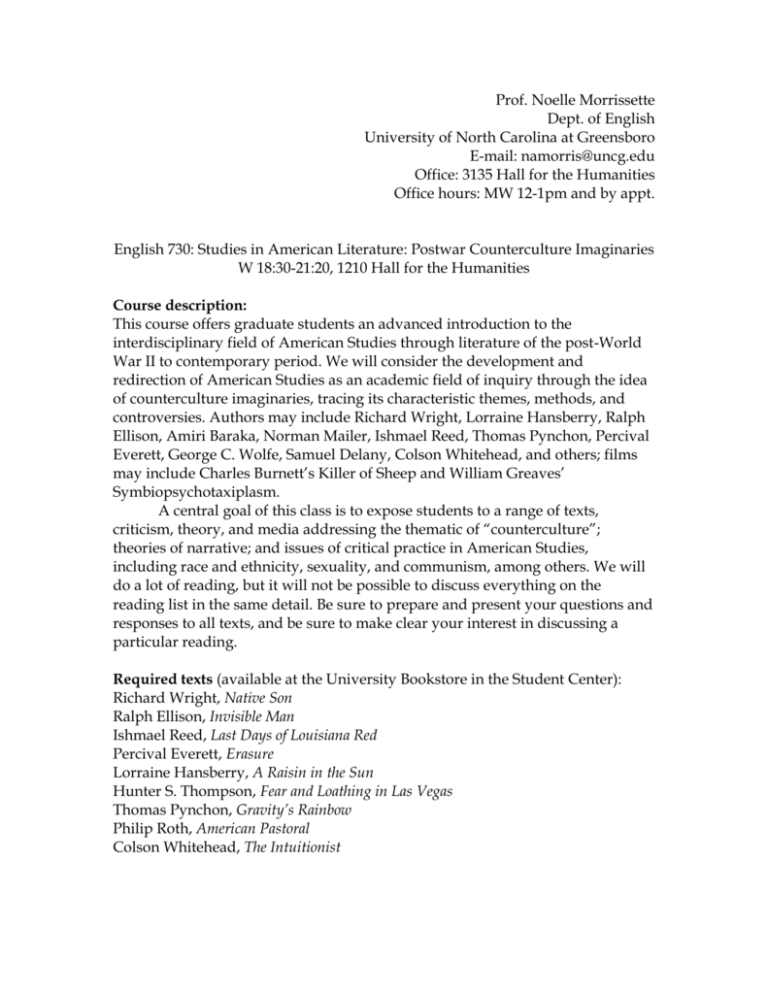
Prof. Noelle Morrissette Dept. of English University of North Carolina at Greensboro E-mail: namorris@uncg.edu Office: 3135 Hall for the Humanities Office hours: MW 12-1pm and by appt. English 730: Studies in American Literature: Postwar Counterculture Imaginaries W 18:30-21:20, 1210 Hall for the Humanities Course description: This course offers graduate students an advanced introduction to the interdisciplinary field of American Studies through literature of the post-World War II to contemporary period. We will consider the development and redirection of American Studies as an academic field of inquiry through the idea of counterculture imaginaries, tracing its characteristic themes, methods, and controversies. Authors may include Richard Wright, Lorraine Hansberry, Ralph Ellison, Amiri Baraka, Norman Mailer, Ishmael Reed, Thomas Pynchon, Percival Everett, George C. Wolfe, Samuel Delany, Colson Whitehead, and others; films may include Charles Burnett’s Killer of Sheep and William Greaves’ Symbiopsychotaxiplasm. A central goal of this class is to expose students to a range of texts, criticism, theory, and media addressing the thematic of “counterculture”; theories of narrative; and issues of critical practice in American Studies, including race and ethnicity, sexuality, and communism, among others. We will do a lot of reading, but it will not be possible to discuss everything on the reading list in the same detail. Be sure to prepare and present your questions and responses to all texts, and be sure to make clear your interest in discussing a particular reading. Required texts (available at the University Bookstore in the Student Center): Richard Wright, Native Son Ralph Ellison, Invisible Man Ishmael Reed, Last Days of Louisiana Red Percival Everett, Erasure Lorraine Hansberry, A Raisin in the Sun Hunter S. Thompson, Fear and Loathing in Las Vegas Thomas Pynchon, Gravity’s Rainbow Philip Roth, American Pastoral Colson Whitehead, The Intuitionist 2 Required Blackboard readings (be sure to bring a paper copy of each reading to scheduled class discussion): Primary Works: Amiri Baraka/Leroi Jones, poetry and early plays Norman Mailer, “The White Negro” Samuel Delany, selections from The Motion of Light in Water, Dahlgren, Times Square Red, Times Square Blue John Rechy, selections, The Sexual Outlaw Secondary works: Irving Howe, “Black Boys and Native Sons” Ralph Ellison, “The World and the Jug” Ralph Ellison, “Hidden Name and Complex Fate” Michael Denning, “‘The Special American Conditions’: Marxism and American Studies” Michael Denning: “The Academic Left and the Rise of Cultural Studies” Baraka: “Swing: From Noun to Verb” Mackey, “Other: From Noun to Verb” Maria San Filippo, “What a Long, Strange Trip It’s Been: William Greaves’ Symbiopsychotaxiplasm Take On” Greil Marcus, “Sly Stone: The Myth of Staggerlee” David Witzling. Selection, Everybody’s America: Thomas Pynchon, Race, and the Cultures of Postmodernism. Stefan Mattessich, selection, Lines of Flight: Discursive Time and Countercultural Desire in the Work of Thomas Pynchon. Leslie Fiedler, “Afterthoughts on the Rosenbergs” Saul Bellow, Chapter One, Mr. Samler’s Planet Required Film Screenings (films on reserve in the UNCG Teaching and Learning Center; please view independently): Greaves, Symbiopsychotaxiplasm Burnett, Killer of Sheep Optional Film Screening: Wattstax Course Requirements (please see below for description): Attendance (required) Participation (required) Class Presentation (oral and written components, together totaling 50%) Research Essay (50%) Course Objectives (Learning Outcomes): 3 Based on the description above, this course is structured to produce the following learning outcomes: 1. Deepen students’ knowledge and appreciation of American literary history from 1940 to the present through the careful analysis of representative texts and authors. Students will improve their understanding of the personal, cultural, and political experiences of Americans as it is reflected in the literature of the period. 2. Improve students’ knowledge and use of appropriate critical and theoretical terminology used in the analysis of literary texts. This terminology will improve students’ ability to analyze and appreciate the formal and aesthetic qualities of literature and deepen their understanding of creative processes. 3. Enhance students’ skills in oral and written expression of critical thinking. Students will practice thinking critically about both the literature they study and the interpretations they produce by questioning the key assumptions operating in the literary texts they read and those that inform their interpretations of those texts. Students will develop their own hypotheses, theories, and interpretations of the literature they read. Students will improve their ability to frame questions, analyze specific images, symbols, passages, and scenes, and to present interpretations of literary work in both oral and written formats. In written communication, particular attention will be paid to writing clear, concise sentences and paragraphs, structuring original analyses and arguments in a clear and compelling way, and documenting arguments effectively through the use of outside sources. 4. Introduce students to ongoing and key critical debates about literature, race, gender, and sexuality in American literary Studies and the field of American Studies. This means that students must present researchoriented work (oral and written) that incorporates their own original thinking in relationship to an established critical and theoretical corpus of thought. Pedagogical Method: This course emphasizes discussion-based teaching, in which student participation animates the direction of the class material. Discussion will focus on facilitating a shared exploration of the meaning of the assigned texts through rigorous analysis of the text itself, consideration of it in relation to other authors, genre, periods, and theory surveyed in our readings. Students are expected to make these connections and foster discussion by addressing questions and comments to their classmates and by active listening. Course Schedule (subject to change as per instructor): 4 W Jan 20th: Introduction to course requirements and materials. Richard Wright, Native Son. W Jan 27th: Ralph Ellison, Invisible Man; Irving Howe, “Black Boys and Native Sons,” Ralph Ellison, “The World and the Jug” and “Hidden Name and Complex Fate”; Norman Mailer, “The White Negro” W Feb 3rd: Percival Everett, Erasure; William Greaves, Symbiopsychotaxiplasm, Parts One and Two W Feb 10th: Thomas Pynchon, “A Journey Into the Mind of Watts”; Greil Marcus, Sly Stone: The Myth of Staggerlee”; Charles Burnett, Killer of Sheep; Rick Perlstein excerpt, Nixonland; Sly and the Family Stone, “There’s a Riot Going On” W Feb 17th: Ishmael Reed, Last Days of Louisiana Red; “Neo Hoo-Doo Manifesto”; Mumbo Jumbo (optional) W Feb 24th: Amiri Baraka/ LeRoi Jones, early plays, poetry, and Dutchman; Hansberry, A Raisin in the Sun; José Muñoz on Baraka’s poetry W March 3rd: Thomas Pynchon, “The Secret Integration”; Part One, Gravity’s Rainbow Sat March 6th through Sun., March 14th: Spring Break W March 17th: Independent work: Thomas Pynchon, Parts Two and Three, Gravity’s Rainbow; Charlie Parker, “Cherokee” W March 24th: Thomas Pynchon, Part Four, Gravity’s Rainbow W March 31st: Hunter S. Thompson, Fear and Loathing in Las Vegas; Oscar Zeta Acosta, Autobiography of a Brown Buffalo (optional) W April 7th: John Rechy, selections, The Sexual Outlaw; Samuel Delany, excerpts, Times Square Red, Times Square Blue and The Motion of Light in Water; Henry Abelove, selection, Deep Gossip. W April 14th: Philip Roth, American Pastoral; Leslie Fiedler, “Afterthoughts on the Rosenbergs”; Saul Bellow, Chapter One, Mr. Samler’s Planet; Michael 5 Denning, “‘The Special American Conditions’: Marxism and American Studies” W April 21st: Colson Whitehead, The Intuitionist; Colossus of New York (optional); Samuel Delany, excerpt, Dhalgren. W April 28th: In-class discussion of individual student projects. W May 5th: Research Paper due in instructor’s mailbox in English Department, 3143 Hall for the Humanities. NO EXCEPTIONS. Outline of Course Policy and Requirements: What you should know about plagiarism: It is incumbent upon you, as a scholar, both to document the borrowings you make from the work of others and to report more general indebtedness to the people and books (and lectures, internet sources, et cetera) you have consulted in the course of preparing your papers. Plagiarism consists of intentionally misrepresenting someone else’s work, words, or insights as your own. Like any other form of intellectual dishonesty, plagiarism is a serious offense in an academic community. A paper that shows evidence of plagiarism will receive a failing grade of “F” and will lead to a failing grade of “F” for the entire course term. Every case of plagiarism will be reported to the University Honor Committee for disciplinary action, which may range from further reprimand to expulsion from UNCG. Students are expected to adhere to the University Academic Honor Policy. See the UNCG Graduate Bulletin and the Policies for Students handbook. Attendance (required) Participation (required) Class Presentation (oral and written components, together totaling 50%) Research Essay (50%) You must complete all assignments, written and oral, to receive a passing grade for this class. Late work: The course moves at a rapid pace, so all work must be completed on time. Late work will lower your final grade. Late written assignments will be penalized by one letter grade per day, with a maximum of two calendar days. After two days, you may not submit your work for a grade and you will receive a zero for the assignment. 6 If you miss your presentation, you will automatically receive a failing grade for the assignment (50% of your final grade). If you fail to provide a handout for your presentation at the time it is given, you will receive a failing grade for the entire presentation (50% of your final grade). Classroom deportment: Our classroom is a space that fosters and supports respect and collaboration. Do not interrupt class with private conversations, note-passing, or late arrival to class. Cell phones, PDAs and Blackberries must be turned off at all times. Use of computers is not permitted without prior permission from instructor. Office Hours: Every week I will be available in my office for consultation. Office hours are your opportunity to talk to me about the reading and writing process and the ideas that you develop on an individual basis. If you cannot make my office hours, you may schedule an appointment with me for another time. Attendance and Participation: Regular attendance and active participation is required. Attendance at all classes is required. Latecomers will be counted as absent. I will accept valid doctor’s notes only as excuses for absences. If you miss two classes, I will inform your academic advisor of your unsatisfactory standing in the class and your final grade will be lowered by one full letter grade per absence, starting with the second absence. If you miss more than three classes, you receive a failing grade for the course. You must keep up with the readings in order to fulfill your obligation as a member of the class and a participant in the ongoing discussion. Your participation will be graded on the basis of the on-time completion of reading assignments. Our class is a seminar, not a lecture: your participation in classroom discussions is not only welcomed—it is required. I expect thoughtful comments and questions and active listening. Class Presentation: Each week, one student will be responsible for that class meeting’s discussion of the assigned texts for the duration of the class period. In addition to preparing the assigned reading in order to facilitate discussion, students will conduct preliminary (not exhaustive) research and select a few relevant angles (critical, biographical, historical, political, et cetera) to introduce to the class. This additional material should include three or more secondary critical texts in brief form as they shape key debates about the subject matter of the assigned reading. Do not provide photocopies of the articles for the class. Instead, you should present the major concepts and analysis of each article and provide their full 7 citation on your handout (see below, under written work). The oral presentation will be assessed on the basis of clear introduction of ideas and effective facilitation of class discussion through the questions you pose to the class. Written work: Presentation Handout (1-2 pp.): Students are responsible for devising and distributing a handout that grounds their additional research and “bullet point” questions about the assigned reading and the critical/theoretical questions it raises. An outline of main points, excerpts of controversial or challenging passages, will help facilitate discussion. Be sure to direct students to passages in the text for analysis. Ask them to make connections to previous discussions and texts. Students may introduce additional relevant material as discussion prompts, such as passages from other writers, from an assigned author’s other works, a current event that operates as an anecdote, et cetera. Students are encouraged to conduct preliminary research in journals, monographs, and databases to prepare the handout, and to cite these materials fully and properly on the handout. Students may wish to annotate these critical/ theoretical works. Annotation requires succinct summary on the importance of the article/book chapter/ monograph in the ongoing critical/theoretical discussion(s) that your research engages. Research Essay (20 pp): Your essay will present your interpretation of a literary text through the practice of close reading—that is, using the primary text (most often in direct quotation) to reinforce, elucidate, and develop your assertions. The essay’s original argument should be defined by linking it to a larger critical issue that we have discussed over the course of the semester (for example, but not limited to, masculinity, feminism, black queer studies). Moreover, your essay must demonstrate breadth of research in the critical issue you identify. A successful essay will position the author’s original critical argument in relationship to theory and criticism addressing the topic and/ or text you have chosen to analyze. Your research essay must have a “Works Cited” page and must adhere to the MLA-style paper format requirements. For all questions of citation, consult the MLA Handbook, available in Reference at the UNCG Jackson Library.

